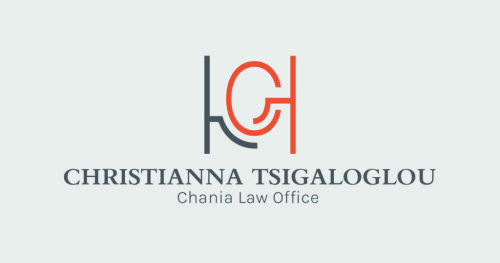Best Real Estate Contracts and Negotiations Lawyers in Chania
Share your needs with us, get contacted by law firms.
Free. Takes 2 min.
Free Guide to Hiring a Real Estate Lawyer
List of the best lawyers in Chania, Greece
About Real Estate Contracts and Negotiations Law in Chania, Greece
Chania, a vibrant region on the island of Crete, is known for its rich history and thriving real estate market. Real estate contracts and negotiations in Chania follow the broader Greek legal framework while also reflecting local practices. These contracts commonly include sales, leases, land use agreements, and property development deals. Greek property law is comprehensive and designed to protect the rights of both buyers and sellers. Typical transactions involve several steps, including due diligence, contract drafting, notarial acts, and registration in the Land Registry.
Negotiations are an essential part of the process, as terms relating to price, payment structure, property condition, and use rights can vary widely. Every real estate transaction is unique, and the legal landscape requires careful attention to detail and proper documentation to prevent disputes and protect your investment.
Why You May Need a Lawyer
Engaging a lawyer for real estate contracts and negotiations in Chania can be crucial for a number of reasons. Some common situations include:
- Buying or selling property, where you need to ensure that the contract protects your interests and complies with local laws
- Negotiating lease agreements for residential, business, or vacation purposes
- Resolving disputes over property boundaries, joint ownership, or inheritance
- Conducting due diligence and verifying property titles to avoid issues such as encumbrances, liens, or unapproved constructions
- Representing you during negotiations with developers, contractors, or real estate agents
- Assisting with conveyancing processes and coordinating with notaries and registrars
- Interpreting complex legal documents, especially for foreign buyers unfamiliar with Greek property law
Having legal guidance helps ensure that your rights are protected and that your real estate transaction proceeds smoothly, minimizing the risk of costly errors or future legal disputes.
Local Laws Overview
Greek real estate law is largely governed by the Civil Code, but several aspects are specific or particularly relevant to property transactions in Chania and Crete. Some key aspects include:
- Property Ownership: Only contracts signed before a Greek notary are considered legally binding and enforceable. The transaction must then be registered at the local Land Registry (Ktimatologio).
- Title Search: A thorough background check is essential to confirm legitimate ownership, absence of debts or encumbrances, and compliance with zoning and building regulations.
- Foreign Investors: Non-Greek citizens can buy property in most areas (including Chania), but may face restrictions near national borders and certain islands. Additional administrative approvals may be required.
- Contract Formalities: Purchase agreements must outline the sale terms, property description, price, payment methods, and any conditions precedent. All parties must provide valid identification and tax numbers (AFM).
- Tax Obligations: The buyer is usually responsible for paying the property transfer tax, typically 3 percent of the property value, as well as registration fees and notarial costs.
- Urban Planning and Permits: Building permits, use restrictions, and planning laws may affect property use and future development. Always check with the municipality or legal counsel for any restrictions or pending approvals.
Awareness of these laws helps avoid legal pitfalls and assures a secure transaction.
Frequently Asked Questions
What is the role of a notary in property transactions in Chania?
A notary is a public official who prepares and authenticates the final sale contract, ensures all legal formalities are met, and submits the deed for registration in the Land Registry. Without a notarial act, the transaction is not legally recognized.
Can foreigners buy property in Chania?
Yes, foreigners can buy property in Chania with relative ease, though certain restrictions may apply in border zones. All buyers must obtain a Greek tax number (AFM) and may need to provide additional documentation.
What taxes and fees are associated with buying property?
Main costs include property transfer tax, notary fees, legal fees, and Land Registry fees. The transfer tax is usually 3 percent of the property value. Other costs vary depending on the transaction’s complexity and property value.
What due diligence should I perform before signing a contract?
It is essential to verify ownership, check for debts, restrictions or legal disputes, confirm building permits, and ensure that the property meets all legal and planning requirements.
How are real estate contracts negotiated in Chania?
Negotiations usually cover price, payment terms, included fixtures, delivery conditions, and deadlines. An experienced lawyer can help you secure favorable terms and anticipate potential problems.
What happens if a party breaches the contract?
The contract should specify remedies for breaches, such as forfeiture of deposits or specific performance. Greek law also provides avenues for legal action and compensation in the event of a breach.
Can I purchase off-plan or under-construction properties?
Yes, but it requires particular care. Legal counsel is crucial to ensure that all permits, developer guarantees, and payment schedules are in order and that your interests are safeguarded.
Do I need to be present in Chania to sign the contract?
While physical presence is standard, you may appoint a lawyer with a power of attorney to represent you if you cannot travel to Chania.
What documents are required to complete a property purchase?
You need a valid passport, Greek tax number (AFM), proof of funds, and often a Greek bank account. Additional documents may be necessary depending on the property and parties involved.
What is the Ktimatologio (Land Registry) and why is it important?
The Ktimatologio is the official Greek Land Registry. Registration of the signed, notarized property deed is essential to establish and publicize legal ownership. Failure to register leaves the buyer without enforceable property rights.
Additional Resources
- Chania Land Registry (Ktimatologio) Office - For property registration and title search services
- Local Bar Association of Chania - For finding qualified real estate lawyers
- Chania Municipality Urban Planning Department - For information on planning permissions and urban restrictions
- Hellenic Cadastre - For property records and public maps
- Greek Tax Authority (AADE) - For tax numbers and documentation for foreigners
- Public Notary Offices in Chania - For notarization and official contract drafting
Visiting or contacting these entities can provide essential documentation, confirm compliance with regulations, and help answer questions about the process.
Next Steps
If you are considering entering into a real estate contract or negotiation in Chania, Greece, here are some recommended steps:
- Begin by outlining your objectives and gathering all relevant property information
- Engage a qualified real estate lawyer with experience in Chania and Greek property law
- Work with your lawyer to conduct complete due diligence, verify all property documentation, and identify any risks
- Collaborate with your lawyer and notary to draft and review the contract, ensuring that all terms are clear and legally secure
- Plan for the required payments for taxes and fees, ensuring availability of funds
- Follow through with the registration process at the Ktimatologio to secure your legal rights after contract signing
Taking these steps with the assistance of an experienced lawyer helps ensure a smooth and secure real estate transaction in Chania.
Lawzana helps you find the best lawyers and law firms in Chania through a curated and pre-screened list of qualified legal professionals. Our platform offers rankings and detailed profiles of attorneys and law firms, allowing you to compare based on practice areas, including Real Estate Contracts and Negotiations, experience, and client feedback.
Each profile includes a description of the firm's areas of practice, client reviews, team members and partners, year of establishment, spoken languages, office locations, contact information, social media presence, and any published articles or resources. Most firms on our platform speak English and are experienced in both local and international legal matters.
Get a quote from top-rated law firms in Chania, Greece — quickly, securely, and without unnecessary hassle.
Disclaimer:
The information provided on this page is for general informational purposes only and does not constitute legal advice. While we strive to ensure the accuracy and relevance of the content, legal information may change over time, and interpretations of the law can vary. You should always consult with a qualified legal professional for advice specific to your situation.
We disclaim all liability for actions taken or not taken based on the content of this page. If you believe any information is incorrect or outdated, please contact us, and we will review and update it where appropriate.











